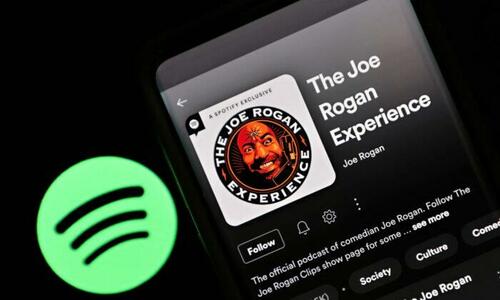
Authored by Chris Summers via The Epoch Times,
Attempts to ban Joe Rogan or get him removed from Spotify for hosting “maverick” voices during the pandemic have “backfired,” a committee of British MPs has been told.
The Digital, Culture, Media and Sport sub-committee on online harms and disinformation has been set up to look at the “role of trusted voices in combating the spread of misinformation” and “ensure the public has sufficient access to authoritative information on matters of national debate.”
Tracey Brown, director of the charity Sense about Science, was one of three scientific experts who were questioned by MPs on Tuesday about lessons that could be learned about the dissemination of factual information, especially about COVID-19.
Brown told the committee:
“Joe Rogan, and ‘The Joe Rogan Experience’ podcast—who got 12.8 million subscribers, 200 million listeners—had a lot of guests on who … were a bit maverick in their thinking.”
“But he was taking an audience of people who were beginning to ask questions about how reliable was the vaccine information. And it wasn’t just about saying vaccines are rubbish, it wasn’t just an anti-vax campaign. He was actually asking a lot of questions that were on a lot of people’s minds,” said Brown.
She said there could have been a conversation with Rogan about the “calibre” of some of his guests, but she said it created an “opportunity” to reach an audience of 200 million people.
Brown said:
“Instead, what happened was a group of epidemiologists in the [United] States wrote to Spotify trying to get him banned and of course, that fed a huge load of conspiracy that was so much harder for us to follow and to get our hands on and to deal with, and I think it really backfires when people in authority try to do that.”
Bob Ward, policy and communications director at the Grantham Research Institute on Climate Change and the Environment, said there was a need for more scientific experts to go to “the coalface” and “engage with the sceptics.”
He said:
“That’s where we really need to focus because our current set-up, where we’re relying on too many gatekeepers who are making bad decisions or the wrong decision, isn’t serving our purposes.”
Ward said: “You gave the example of the January 6th insurrection in the United States and what we’ve seen in Brazil. Hand on heart, could we say that could never happen here in the UK?”
“I wouldn’t be confident in saying we would never have that happen here. And so better that we learn from the dangers that others have experienced and act preemptively rather than wait until they get as bad there and then go, ‘Oh dear, we should have done something.'”
Misinformation and Disinformation
Ward added: “Let me make a distinction here. Misinformation is inaccurate or misleading information. Disinformation is misleading and inaccurate information which is spread specifically to deceive.”
The chairman of the committee, Damian Green, asked Ward:
“If you model you project into the future … and sometimes you’re going to get it wrong. I mean, we all remember the projections of tens of thousands of deaths from BSE [Bovine Spongiform Encephalopathy, or Mad Cow Disease] and things like that which turned out not to be true.”
Ward replied:
“Well, that’s because modelling is generally misunderstood. I mean, modeling is used in scenarios in situations where you cannot give probabilities … Largely what was happening is the modeling was presented, by the media and other sources, as if these were predictions of an inevitable outcome. Whereas actually, what they were saying is, no policy will get you here. These policies will get you here.”
Chris Smith, clinical director in virology at the University of Cambridge, said: “Social media and the internet has been an amazing thing and it has transformed the world. But what it has also done is to break all of the existing models that meant there was good curated information of responsible reporting and there were editorial practices, because it basically hands a megaphone to anybody.”
He said: “The way these algorithms are created on things like Twitter is they will find you people who agree with you. So if you say something, it will go and find a bunch of people who say the same thing as you and it makes you friends with them. So even if you previously had nobody listening to a thing you said and no one would have believed you, suddenly you’re introduced to enormous loads of people who appear to share your opinion, which reinforces your self-belief.”
Smith said he posted on social media that he had just taken the Pfizer vaccine and he said, “Someone sent me back the circuit diagram for the microchips that were in the vaccine that I had just received and that Bill Gates was now using to control me.”
He went on: “I thought this is quite intriguing because it didn’t look like any microchip circuit diagram I’d ever seen. So I went and looked it up. And it was actually the wah pedal for a guitar.”
Patients lie on beds in a hallway in the emergency department of Zhongshan Hospital, amid a COVID-19 outbreak in Shanghai, China, on Jan. 3, 2023. (Staff/Reuters)
Smith said, “Anyone who doesn’t have the intelligence, or the necessary background education, to pick that apart and realise and see it for what it is, would have been potentially seduced by that piece of disinformation … and potentially put off of getting vaccinated.”
Smith went on to explain how viruses work and he pointed out that in the 1890s there was an outbreak of a virus called OC43—which was better known as Russian flu—which “spread like wildfire” after jumping from cows to humans, and killed a large number of people.
He said: “I guarantee if I go and test 100 people off the streets out there I’ll find probably about five or 10 of them with it today. And they will have the symptoms of the common cold. So what happens is that these things start off as a dramatic splash in the water and then the ripples slowly subside as we become better bedfellows with the virus and the virus becomes better bedfellows with us and we adapt to it.”
Smith said: “What we’re in a situation with COVID right now is … we’ve adapted and we’re now in a position where it’s causing a common cold-type manifestation across most of the world, except in China, where people haven’t spent the last three years catching it. Unlike this country where about 90 percent of the population is having it more than once, no one really has had it in China. Now they’re all getting it, so it’s like it was here three years ago.”
Authored by Chris Summers via The Epoch Times,
Attempts to ban Joe Rogan or get him removed from Spotify for hosting “maverick” voices during the pandemic have “backfired,” a committee of British MPs has been told.
The Digital, Culture, Media and Sport sub-committee on online harms and disinformation has been set up to look at the “role of trusted voices in combating the spread of misinformation” and “ensure the public has sufficient access to authoritative information on matters of national debate.”
Tracey Brown, director of the charity Sense about Science, was one of three scientific experts who were questioned by MPs on Tuesday about lessons that could be learned about the dissemination of factual information, especially about COVID-19.
Brown told the committee:
“Joe Rogan, and ‘The Joe Rogan Experience’ podcast—who got 12.8 million subscribers, 200 million listeners—had a lot of guests on who … were a bit maverick in their thinking.”
“But he was taking an audience of people who were beginning to ask questions about how reliable was the vaccine information. And it wasn’t just about saying vaccines are rubbish, it wasn’t just an anti-vax campaign. He was actually asking a lot of questions that were on a lot of people’s minds,” said Brown.
She said there could have been a conversation with Rogan about the “calibre” of some of his guests, but she said it created an “opportunity” to reach an audience of 200 million people.
Brown said:
“Instead, what happened was a group of epidemiologists in the [United] States wrote to Spotify trying to get him banned and of course, that fed a huge load of conspiracy that was so much harder for us to follow and to get our hands on and to deal with, and I think it really backfires when people in authority try to do that.”
Bob Ward, policy and communications director at the Grantham Research Institute on Climate Change and the Environment, said there was a need for more scientific experts to go to “the coalface” and “engage with the sceptics.”
He said:
“That’s where we really need to focus because our current set-up, where we’re relying on too many gatekeepers who are making bad decisions or the wrong decision, isn’t serving our purposes.”
Ward said: “You gave the example of the January 6th insurrection in the United States and what we’ve seen in Brazil. Hand on heart, could we say that could never happen here in the UK?”
“I wouldn’t be confident in saying we would never have that happen here. And so better that we learn from the dangers that others have experienced and act preemptively rather than wait until they get as bad there and then go, ‘Oh dear, we should have done something.’”
Misinformation and Disinformation
Ward added: “Let me make a distinction here. Misinformation is inaccurate or misleading information. Disinformation is misleading and inaccurate information which is spread specifically to deceive.”
The chairman of the committee, Damian Green, asked Ward:
“If you model you project into the future … and sometimes you’re going to get it wrong. I mean, we all remember the projections of tens of thousands of deaths from BSE [Bovine Spongiform Encephalopathy, or Mad Cow Disease] and things like that which turned out not to be true.”
Ward replied:
“Well, that’s because modelling is generally misunderstood. I mean, modeling is used in scenarios in situations where you cannot give probabilities … Largely what was happening is the modeling was presented, by the media and other sources, as if these were predictions of an inevitable outcome. Whereas actually, what they were saying is, no policy will get you here. These policies will get you here.”
Chris Smith, clinical director in virology at the University of Cambridge, said: “Social media and the internet has been an amazing thing and it has transformed the world. But what it has also done is to break all of the existing models that meant there was good curated information of responsible reporting and there were editorial practices, because it basically hands a megaphone to anybody.”
He said: “The way these algorithms are created on things like Twitter is they will find you people who agree with you. So if you say something, it will go and find a bunch of people who say the same thing as you and it makes you friends with them. So even if you previously had nobody listening to a thing you said and no one would have believed you, suddenly you’re introduced to enormous loads of people who appear to share your opinion, which reinforces your self-belief.”
Smith said he posted on social media that he had just taken the Pfizer vaccine and he said, “Someone sent me back the circuit diagram for the microchips that were in the vaccine that I had just received and that Bill Gates was now using to control me.”
He went on: “I thought this is quite intriguing because it didn’t look like any microchip circuit diagram I’d ever seen. So I went and looked it up. And it was actually the wah pedal for a guitar.”
Patients lie on beds in a hallway in the emergency department of Zhongshan Hospital, amid a COVID-19 outbreak in Shanghai, China, on Jan. 3, 2023. (Staff/Reuters)
Smith said, “Anyone who doesn’t have the intelligence, or the necessary background education, to pick that apart and realise and see it for what it is, would have been potentially seduced by that piece of disinformation … and potentially put off of getting vaccinated.”
Smith went on to explain how viruses work and he pointed out that in the 1890s there was an outbreak of a virus called OC43—which was better known as Russian flu—which “spread like wildfire” after jumping from cows to humans, and killed a large number of people.
He said: “I guarantee if I go and test 100 people off the streets out there I’ll find probably about five or 10 of them with it today. And they will have the symptoms of the common cold. So what happens is that these things start off as a dramatic splash in the water and then the ripples slowly subside as we become better bedfellows with the virus and the virus becomes better bedfellows with us and we adapt to it.”
Smith said: “What we’re in a situation with COVID right now is … we’ve adapted and we’re now in a position where it’s causing a common cold-type manifestation across most of the world, except in China, where people haven’t spent the last three years catching it. Unlike this country where about 90 percent of the population is having it more than once, no one really has had it in China. Now they’re all getting it, so it’s like it was here three years ago.”
Loading…








